Strictly Personal
Babajide Sanwo-Olu, APC and the question of continuity in Lagos, By Wale Ajayi
Published
1 year agoon

It is not news that Lagos has one of the largest and fastest growing sub-national economies in Africa as the economic and commercial nerve centre of our country Nigeria. It’s equally not news that Lagos is projected for even bigger and better things but there’s still more work to be done to achieve this. We can argue that Lagos is on a trajectory for development and it’s a pride for all of us. What is surprising these days is the belief in some quarters that those in charge of Lagos since 1999 have had little or no contribution to the development of Lagos. May I emphatically dismiss these notions with a sense of responsibility, as these are just attempts at manipulating the electorate.
It is funny how some even say the government of Lagos hasn’t been doing anything, and that all the development has been done since when Lagos was a federal capital territory. As much as these arguments are lame, it is important to say that only a part of the entire area of the current Lagos state was the FCT which was then administered by Lagos City Council (LCC). The then Lagos FCT stretches from Surulere in the far west along Western avenue to Victoria Island and Ikoyi which is the major secretariat. The area of the Lagos FCT can best be described as the current Lagos central senatorial district which includes local government areas like Lagos Island, Lagos Mainland, Eti-Osa, Surulere, and Apapa. The rest of the two senatorial districts comprising 15 LGAs were part of the western region.
It is fact that since 1999, the dominant political party – the APC (as ACN, AC, and AD) has held sway and they have had successive leaders like the President-elect Asiwaju Bola Ahmed Tinubu, Babatunde Raji Fashola (SAN), Akinwunmi Ambode, and the current governor Babajide Olushola Sanwo-Olu. The political party and group have maintained their dominance throughout different phases of our newest and the longest political dispensation since 1999 starting in opposition in Lagos, then to regional dominance, and most recently to becoming the party in federal power. All these are products of hard work, tenacity, and innovativeness of the core leaders of the party and the resolve of our cosmopolitan people to identify with the progressives throughout these 23 years and over six election cycles.
As much as we may have genuine reasons for grievances over unmet expectations, there has been significant progress since 1999 and there’s always room for improvement. Our people need to be reminded of where we are coming from and where we are in terms of developmental strides in Lagos state. Socio-economic development can only happen in an underdeveloped society by first solving the basic problems that can help people realize their potential. Qualitative and affordable education for human capital development, accessible healthcare service to support body and soul, a decent living wage to meet basic necessities like food, clothing, and shelter, and a secure environment that allows individual innovation to develop and businesses to thrive. For me, these are the main cross of policy formulators of developing economies. In Lagos, our healthcare service, public education, transportation services, infrastructures, security, and civic engagement have been on a continuous trend of improvement from 1999 – to date. Some of us, aged 30 years and above, may remember how some of our public primary and secondary schools were then compared to now and the tremendous improvement in the facilities, learning environment and teacher motivation through various educational reforms in education since 1999, and this is a testimony that’s climaxed with EKO Project by successive APC governments.
A visit to most of those public schools now showed tremendous improvement and complete transformation from what they used to be in 1999. To ensure no student drops out due to inability to pay fees, the Lagos state government implemented free education in all public primary and secondary schools, including payment of WAEC/NECO fees for all students regardless of their state of origin. I was one of those final-year secondary school students who benefitted from the payment of NECO exam fees in 2002. Graduating sets before ours benefitted and I am glad this continues to this day. Tertiary education continues to also receive significant attention from the government. Several upgrade projects, facility improvement, and staff motivation have been done in the Lagos State University, Lagos State College of Medicine (LASUCOM) and other polytechnic and colleges run by the state, improving teaching and learning experiences. Most recently in the realization of the need for expanding university education services in the state, the state government under Governor Babajide Olushola Sanwo’olu has announced the establishment of two additional universities – Lagos State University of Technology Ikorodu with campuses in Ikorodu and Isolo and Lagos State University of Education Epe with campuses in Epe and Ijanikin. These were achieved by upgrading the former Lagos State Polytechnic in Ikorodu and Isolo, state-owned Adeniran Ogunsanya College of Education Ijanikin, and Micheal Otedola College of Primary Education Epe. Here’s a government which is in tune with current realities and innovatively responding and providing solutions.
I’m sure we will not also forget the dangerous security situation in 1999, of armed robberies, armed gang clashes and cultism that dominated that era. It got so bad at some point that armed robbers will rob a house today and come for the next tomorrow. Or should we forget the inglorious periods when armed robbers will write letters to inform residents they are coming and they will? Have we forgotten also how communities and streets resorted to self-help through “VIGILANTE,” a localized security system burning tires on the roads to keep vigil and public maiming and burning of thieves? Upon inauguration in 1999, the government prioritized these and established what we know as “Rapid Response Squad (RRS)” a well-equipped and well-motivated crime prevention and fighting outfit of the police and other law enforcement agencies by reorganizing “Operation Sweep” they inherited. From RRS to OP MESA, the Lagos state government has lived up to the responsibility of improving the security of lives and properties. In other to continue these trends of prioritizing security and sustain it beyond now, the Lagos state government established the Lagos State Security Trust Fund (LSSTF) in 2010 in partnership with the corporate sector. The trust fund continues to yield positive results in improving the security of lives and properties by providing necessary equipment both hardware and software for modern-day security infrastructure like CCTV in major areas and business districts, fortified situation rooms, and motivated personnel. Realizing most crimes are localized in the communities, the Lagos state government have also over the period under review established the Lagos Neighborhood Safety Corps (LNSC) a community-based uniformed civil security system strategic for complimenting police in maintaining law and order, crime prevention, as well as information gathering. The agents have been seen manning public school gates and helping traffic flow on the roads and highways thereby complementing the work of LASTMA. We must have also seen them well-kitted on their beautiful bikes surveying the streets and detecting and reporting crimes and public disorder to law enforcement agents. Despite the improvement in all facets of the security system, we must also acknowledge that as we tackle old crimes and security challenges we also have to deal with newer ones. The last few years have seen a reduction in armed robberies, gang fighting, cultism, and burglary but we now have to contend with newer crimes like kidnapping for ransom, internet scams, and occultic activities like ritual killing for money or/and organ harvesting. A lot more work is still needed as society evolves but the government is far more in a position to tackle these problems by building on previous gains.
Health is wealth. This is not truer than the manner in which the Lagos state government has prioritized the provision of accessible and inclusive healthcare services to all in Lagos. From subsidized healthcare services for young people below 16 and old people from age 60 and above to continuous upgrades of all general hospitals, primary healthcare centres, and the building of new ones. In addition to these conventional hospitals, the state has also established several other specialists and purposefully built medical facilities like the Burns and Trauma Center in Gbagada, Accident and Emergency Center at Old Toll Gate, and several Mother and Child Centers (MCC) strategically located around the state. The Lagos State Ambulance Services (LASAMBUS) come along as a special-purpose emergency responder for accidents and other emergencies. We cannot also forget quickly how the Lagos State government has become a champion, a pacesetter, and a good reference of global repute in public health management, especially during pandemics. The state was globally commended for how it managed the Ebola crisis during the time of Governor Fashola and Dr. ‘Jide Idris as commissioner for health. The World Health Organization and the United Nations were full of commendations for the state government, the governor, and his team. Such is the excellence of Lagos state. Little have we resolved the Ebola crisis that the world is besieged with yet another public health crisis with COVID-19. Lagos being the major entry into our country again became one of the major risks like other major entry points in other countries. This template and model for managing Ebola became an easy adoption by most states, the federal government, and even many other countries. Such greatness in the time of emergency is the quality leadership we have been having under APC in Lagos.
Twenty-one years down the line, these concerted efforts have yielded a lot of results transforming the transportation landscape of Lagos and creating jobs and business opportunities for private sector participation. The state’s massive investment in a modernized mass transit system with Bus Rapid Transport (BRT) with dedicated routes to reduce travel time is a first in our country and Africa, a feat ingeniously developed by the thinking team of Lagos government which has achieved successes that are widely commended and admired world over. It’s also important to add that the BRT system has been replicated in some states and some countries like Morocco, Tanzania, and South Africa. Successive Lagos state governments through LAMATA have continued to implement the master plan and improve on the previous achievement in the transport section with the execution of modernized transportation infrastructure like the bus terminals in Ikeja, Yaba, Oyingbo, and MMA Mafoluku. In the category of modernized major transport infrastructure, the multi-terminal Oshodi transport interchange deserves special mention. There can be no number of words that can describe how Oshodi used to be and how it has become after the project development than for the readers to embark on this journey of discovery. It’s a complete 360 degrees turnaround. Lagos has not only welcomed several private-led contributions into the transport mix like the e-hailing taxis like Uber and Bolt (formerly Taxify) but has also recently introduced LagosRide as an alternative taxi. Comfortable inner city minibuses were also introduced last year as a gradual alternative to the legendary danfos and Vanagon.
To complement this, Lagos has also witnessed significant development in road infrastructural development within this period. The Lekki-Epe expressway, the Ikoyi link bridge linking Ikoyi to Lekki, the Ajah flyover, the western avenue upgrade, and the Agege Motor Road upgrade from Mushin-Idi Oro that hitherto was a menace. The Abule-Egba flyover, the ongoing Opebi Ojota link bridge, the massive road and bridge infrastructure in Epe, the Ikorodu massive road and bridge project, the 21 roads and two bridges projects in Alimosho extending to areas bordering Ogun State from Aboru, Command, Ikola, Ipaja, Ayobo, Agbelekale, Ekoro, AIT Road with three link bridges Aboru, Ota, and Ayobo. The Agege Pen Cinema interchange bridge linking and connecting several towns and cities. The soon-to-be-completed Ikeja bridge and flyover, Yaba bridge and flyover, and the 10-lane Lagos-Badagry expressway incorporated with rail lines.
A few weeks ago, the state government’s unwavering determination to include rail transport in the mix of the intramural transport system saw a major boost with the commissioning of the first phase of the Lagos Rail Mass Transit (LRMT)’s Blue Line which shall run from Okokomaiko (Mile 2) to Marina through the National Theatre in Iganmu corridor. The second phase of this project shall birth the Red Line which shall connect Agbado to Marina via the Ikeja and Yaba corridor. These achievements remain a pointer to the progress and development of the state and her people. The state government’s massive investments in modernized terminals, jetties, and efficient boats through Lagos State Waterways Authority (LASWA) cannot be overemphasized. The epoch Five Cowry Terminal, Ikorodu terminal, Ebute Ero, and Badore, and other jetties underscore the government’s commitment to developing the water transport system. The joy of people living in Ikorodu and its environs boating from that part of the state to the cities in a few minutes, escaping the excruciating hold-ups on the roads knew no bounds since their route became operational with assured safety.
Development is incremental and not an easy task. The projected mega city can’t be actualized by the singular effort of the government alone. Private sector participation is critical to success. Investors must see the seriousness and consistency of the government and its policies. As we are all aware no business person will like to invest their money in an atmosphere of insecurities and uncertainties. That Lagos is an investment destination of first choice in Nigeria is an attestation to investors’ confidence in the government and the leadership in the state. I’m sure some of us love the sights and scenes in all the shopping malls scattered around Lagos state in Lekki, Sangotode, Victoria Island, Suruere, Ilupeju, Ikeja, and Festac, with major international brands like Shoprite, Jara, Novare, Aldi, Adide, Justrite, etc. All these private investments can only happen if the investor has confidence in the government and their policies. The comfort and contributions of these investments to job creation and the economy of the state at large cannot be overemphasized.
Lagos is the entertainment capital of Nigeria and Africa. From music to movies, Nollywood, the cinemas and concerts, the hotels, the food, fashion, pubs and clubs from the mainland to the island, Lagos doesn’t sleep. The festivals and the social culture of Lagos are known globally. Our people and foreigners alike have found Lagos the most secure place to live, work, and invest in any other place in the country for many obvious reasons. No wonder they say Lagos is the centre of excellence and the land of opportunities. It is only Lagos you come to with nothing and later become something big. I’m sure you like going to the two parks in Ikeja with your families and friends. All these and more make Lagos what it is. It is not by coincidence that Lagos state has now grown to be the fifth largest economy in Africa, all thanks to the resolve of Lagosians to have a stable and progressive government for consistency of government programs. Ladies and gentlemen, all these projects and developments mentioned were done between 1999 and today. Do not let anyone deceive you or attempt unnecessary historical revisionism.
We should not allow the gains of the past 23 years to go down the drain. It’s your duty as it’s mine to preach this message, canvass, appeal, and beg our people. Parents should appeal to their children, brothers and sisters to their siblings, uncles to their nieces and nephew, husband to wife, boyfriends to girlfriends, padi to padi, in family compounds, our neighbourhood, and in our businesses. We need to take more than a passing interest in the need to ensure Governor Babajide Olushola Sanwo’Olu and the house of assembly members of APC win the coming election.
Fellow Lagosian, the development that Lagos has experienced under APC is unparalleled among the states in Nigeria. Contrary to some beliefs that our leaders viz a viz the government in Lagos since 1999 hasn’t done enough, it is sufficient to clarify that indeed Lagos has witnessed a progressive development of monumental size. Lagos remains and continues to be the confluence of all different tribes, ethnic, and faith in Nigeria and a choice destination for business and pleasure for the international community. The development made in Lagos doesn’t discriminate against any tribe or faith or race. The government of APC and governor Babajide Olusola Sanwo-Olu have kept their promise by delivering on continuous improvement of our dear Lagos.
My brothers and sisters in the Hausa-Fulani communities, the Igbo communities and trade unions, the Ibibios, the Nupes, the Ijaws, the Benins, the Urhobos, the Itsekiris, the Idomas, the Igalas, the Jukuns, and all other non-Yoruba tribes in Lagos, you know as much that this is the only state doesn’t discriminate against you, your business, your livelihood and those of your children, do not abandon the government, the governor, and APC at the moment of critical need.
You may like
-


Nigerian govt shuts Chinese supermarket over ‘no-Nigerian shopper’ allegation
-
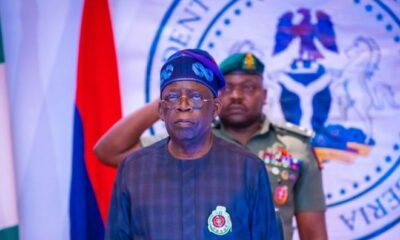

Nigeria: President Tinubu identifies illegal mining as source of terrorism financing
-


Nigeria wants $2.25 billion World Bank loan
-
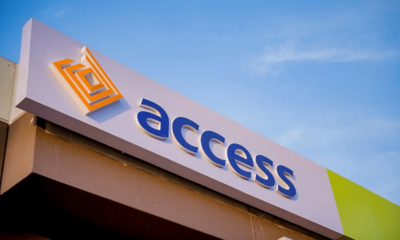

Nigeria’s Access Bank says its N365bn capital raise to be fully digital
-
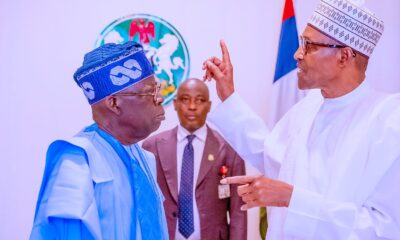

Nigeria: Unlike Buhari, Tinubu’s govt has not borrowed from the central bank— Finance Minister
-


Yoruba secessionist group seeks exit from Nigeria, writes open letter to Tinubu
Strictly Personal
Air Peace, capitalism and national interest, By Dakuku Peterside
Published
7 days agoon
April 16, 2024
Nigerian corporate influence and that of the West continue to collide. The rationale is straightforward: whereas corporate activity in Europe and America is part of their larger local and foreign policy engagement, privately owned enterprises in Nigeria or commercial interests are not part of Nigeria’s foreign policy ecosystem, neither is there a strong culture of government support for privately owned enterprises’ expansion locally and internationally.
The relationship between Nigerian businesses and foreign policy is important to the national interest. When backing domestic Nigerian companies to compete on a worldwide scale, the government should see it as a lever to drive foreign policy, and national strategic interest, promote trade, enhance national security considerations, and minimize distortion in the domestic market as the foreign airlines were doing, boost GDP, create employment opportunities, and optimize corporate returns for the firms.
Admitted nations do not always interfere directly in their companies’ business and commercial dealings, and there are always exceptions. I can cite two areas of exception: military sales by companies because of their strategic implications and are, therefore, part of foreign and diplomatic policy and processes. The second is where the products or routes of a company have implications for foreign policy. Air Peace falls into the second category in the Lagos – London route.
Two events demonstrate an emerging trend that, if not checked, will disincentivize Nigerian firms from competing in the global marketplace. There are other notable examples, but I am using these two examples because they are very recent and ongoing, and they are typological representations of the need for Nigerian government backing and support for local companies that are playing in a very competitive international market dominated by big foreign companies whose governments are using all forms of foreign policies and diplomacy to support and sustain.
The first is Air Peace. It is the only Nigerian-owned aviation company playing globally and checkmating the dominance of foreign airlines. The most recent advance is the commencement of flights on the Lagos – London route. In Nigeria, foreign airlines are well-established and accustomed to a lack of rivalry, yet a free-market economy depends on the existence of competition. Nigeria has significantly larger airline profits per passenger than other comparable African nations. Insufficient competition has resulted in high ticket costs and poor service quality. It is precisely this jinx that Air Peace is attempting to break.
On March 30, 2024, Air Peace reciprocated the lopsided Bilateral Air Service Agreement, BASA, between Nigeria and the United Kingdom when the local airline began direct flight operations from Lagos to Gatwick Airport in London. This elicited several reactions from foreign airlines backed by their various sovereigns because of their strategic interest. A critical response is the commencement of a price war. Before the Air Peace entry, the price of international flight tickets on the Lagos-London route had soared to as much as N3.5 million for the economy ticket. However, after Air Peace introduced a return economy class ticket priced at N1.2 million, foreign carriers like British Airways, Virgin Atlantic, and Qatar Airways reduced their fares significantly to remain competitive.
In a price war, there is little the government can do. In an open-market competitive situation such as this, our government must not act in a manner that suggests it is antagonistic to foreign players and competitors. There must be an appearance of a level playing field. However, government owes Air Peace protection against foreign competitors backed by their home governments. This is in the overall interest of the Nigerian consumer of goods and services. Competition history in the airspace works where the Consumer Protection Authority in the host country is active. This is almost absent in Nigeria and it is a reason why foreign airlines have been arbitrary in pricing their tickets. Nigerian consumers are often at the mercy of these foreign firms who lack any vista of patriotism and are more inclined to protect the national interest of their governments and countries.
It would not be too much to expect Nigerian companies playing globally to benefit from the protection of the Nigerian government to limit influence peddling by foreign-owned companies. The success of Air Peace should enable a more competitive and sustainable market, allowing domestic players to grow their network and propel Nigeria to the forefront of international aviation.
The second is Proforce, a Nigerian-owned military hardware manufacturing firm active in Rwanda, Chad, Mali, Ghana, Niger, Burkina Faso, and South Sudan. Despite the growing capacity of Proforce in military hardware manufacturing, Nigeria entered two lopsided arrangements with two UAE firms to supply military equipment worth billions of dollars , respectively. Both deals are backed by the UAE government but executed by UAE firms.
These deals on a more extensive web are not unconnected with UAE’s national strategic interest. In pursuit of its strategic national interest, India is pushing Indian firms to supply military equipment to Nigeria. The Nigerian defence equipment market has seen weaker indigenous competitors driven out due to the combination of local manufacturers’ lack of competitive capacity and government patronage of Asian, European, and US firms in the defence equipment manufacturing sector. This is a misnomer and needs to be corrected.
Not only should our government be the primary customer of this firm if its products meet international standards, but it should also support and protect it from the harsh competitive realities of a challenging but strategic market directly linked to our national military procurement ecosystem. The ability to produce military hardware locally is significant to our defence strategy.
This firm and similar companies playing in this strategic defence area must be considered strategic and have a considerable place in Nigeria’s foreign policy calculations. Protecting Nigeria’s interests is the primary reason for our engagement in global diplomacy. The government must deliberately balance national interest with capacity and competence in military hardware purchases. It will not be too much to ask these foreign firms to partner with local companies so we can embed the technology transfer advantages.
Our government must create an environment that enables our local companies to compete globally and ply their trades in various countries. It should be part of the government’s overall economic, strategic growth agenda to identify areas or sectors in which Nigerian companies have a competitive advantage, especially in the sub-region and across Africa and support the companies in these sectors to advance and grow to dominate in the African region with a view to competing globally. Government support in the form of incentives such as competitive grants ,tax credit for consumers ,low-interest capital, patronage, G2G business, operational support, and diplomatic lobbying, amongst others, will alter the competitive landscape. Governments and key government agencies in the west retain the services of lobbying firms in pursuit of its strategic interest.
Nigerian firms’ competitiveness on a global scale can only be enhanced by the support of the Nigerian government. Foreign policy interests should be a key driver of Nigerian trade agreements. How does the Nigerian government support private companies to grow and compete globally? Is it intentionally mapping out growth areas and creating opportunities for Nigerian firms to maximize their potential? Is the government at the domestic level removing bottlenecks and impediments to private company growth, allowing a level playing field for these companies to compete with international companies?
Why is the government patronising foreign firms against local firms if their products are of similar value? Why are Nigerian consumers left to the hands of international companies in some sectors without the government actively supporting the growth of local firms to compete in those sectors? These questions merit honest answers. Nigerian national interest must be the driving factor for our foreign policies, which must cover the private sector, just as is the case with most developed countries. The new global capitalism is not a product of accident or chance; the government has choreographed and shaped it by using foreign policies to support and protect local firms competing globally. Nigeria must learn to do the same to build a strong economy with more jobs.
Strictly Personal
This is chaos, not governance, and we must stop it, By Tee Ngugi
Published
2 weeks agoon
April 10, 2024
The following are stories that have dominated mainstream media in recent times. Fake fertiliser and attempts by powerful politicians to kill the story. A nation of bribes, government ministries and corporations where the vice is so routine that it has the semblance of policy. Irregular spending of billions in Nairobi County.
Billions are spent in all countries on domestic and foreign travel. Grabbing of land belonging to state corporations, was a scam reminiscent of the Kanu era when even public toilets would be grabbed. Crisis in the health and education sectors.
Tribalism in hiring for state jobs. Return of construction in riparian lands and natural waterways. Relocation of major businesses because of high cost of power and heavy taxation. A tax regime that is so punitive, it squeezes life out of small businesses. Etc, ad nauseam.
To be fair, these stories of thievery, mismanagement, negligence, incompetence and greed have been present in all administrations since independence.
However, instead of the cynically-named “mama mboga” government reversing this gradual slide towards state failure, it is fuelling it.
Alternately, it’s campaigning for 2027 or gallivanting all over the world, evoking the legend of Emperor Nero playing the violin as Rome burned.
A government is run based on strict adherence to policies and laws. It appoints the most competent personnel, irrespective of tribe, to run efficient departments which have clear-cut goals.
It aligns education to its national vision. Its strategies to achieve food security should be driven by the best brains and guided by innovative policies. It enacts policies that attract investment and incentivize building of businesses. It treats any kind of thievery or negligence as sabotage.
Government is not a political party. Government officials should have nothing to do with political party matters. They should be so engaged in their government duties that they literally would not have time for party issues. Government jobs should not be used to reward girlfriends and cronies.
Government is exhausting work undertaken because of a passion to transform lives, not for the trappings of power. Government is not endless campaigning to win the next election. To his credit, Mwai Kibaki left party matters alone until he had to run for re-election.
We have corrupted the meaning of government. We have parliamentarians beholden to their tribes, not to ideas.
We have incompetent and corrupt judges. We have a civil service where you bribe to be served. Police take bribes to allow death traps on our roads. We have urban planners who plan nothing except how to line their pockets. We have regulatory agencies that regulate nothing, including the intake of their fat stomachs.
We have advisers who advise on which tenders should go to whom. There is no central organising ethos at the heart of government. There is no sense of national purpose. We have flurries of national activities, policies, legislation, appointments which don’t lead to meaningful growth. We just run on the same spot.
Tee Ngugi is a Nairobi-based political commentator
EDITOR’S PICK


Egypt reclaims 3,400-year-old stolen statue of King Ramses II
Egypt has received a 3,400-year-old statue depicting the head of King Ramses II that was stolen and smuggled out of...


Sign language interpreter, Kunda, seeks inclusivity in media rights agenda
An inclusive society is crucial for a nation’s human and economic development in the modern era. In this edition of...
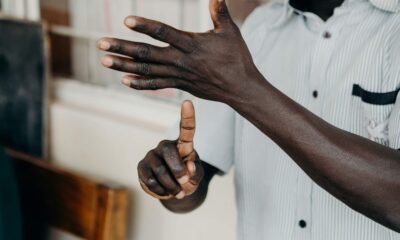

Sign language interpreter, Kunda, seeks inclusivity in media rights agenda (video)
An inclusive society is crucial for a nation’s human and economic development in the modern era. In this edition of...


Educationist challenges media freedom norms, cautions against misuse of freedom of expression
Geshom Banda, Deputy Head Teacher at Hillside Primary School, presents a contrasting perspective amidst discussions on media freedom and digital...


Nigerian govt shuts Chinese supermarket over ‘no-Nigerian shopper’ allegation
Nigeria’s Federal Competition and Consumer Protection Commission has shut down a Chinese store in Abuja, the country’s capital, because it...


Nigeria: President Tinubu identifies illegal mining as source of terrorism financing
Nigeria’s President Bola Tinubu has identified illegal mining activities as a major source of terrorism financing in the country and...


Nigeria wants $2.25 billion World Bank loan
Nigeria’s Finance Minister, Wale Edun, has revealed that the country is seeking up to $2.25 billion in World Bank loans...
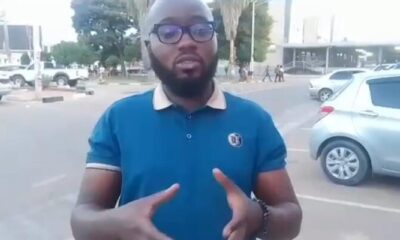

‘Complex, contentious,’ media enthusiast says media rights often depend on goodwill of political leadership (video)
Kitwe Press Club spokesperson, Michael Kaluba, has described the media landscape in Zambia as complex and contentious. In a conversation...


UN signs MoU with Kenya’s Konza Technopolis
The United Nations has signed a Memorandum of Understanding (MoU) with Kenya’s Konza Technopolis that will provide a wide range...


Ghana mourns as top gospel music icon Koda passes away
The Ghanaian entertainment industry has, once again, been thrown into mourning following the death of renowned gospel musician, Kofi Owusu...
Trending
-
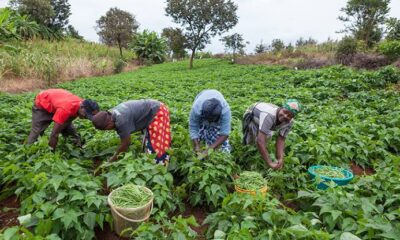
 Tech2 days ago
Tech2 days agoKenya’s agri-tech startup Pula raises $20m funding for farmers’ insurance
-

 Behind the News1 day ago
Behind the News1 day agoBehind the News: All the backstories to our major news this week
-

 Metro1 day ago
Metro1 day agoBinance executive who escaped from Nigeria arrested in Kenya
-

 VenturesNow2 days ago
VenturesNow2 days agoNigeria’s Access Bank says its N365bn capital raise to be fully digital


